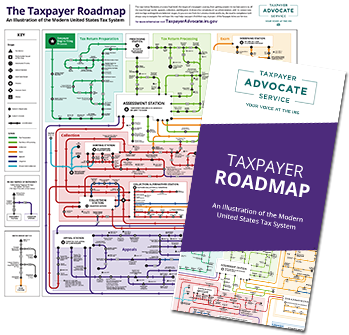Letter 3886
Special Condition Notice of Federal Tax Lien Filing – Taxpayer
View our interactive tax map to see where you are in the tax process. It could help you navigate your way through the IRS.
View our interactive tax map to see where you are in the tax process. It could help you navigate your way through the IRS.

You have a balance on your tax account which you have not paid and the IRS has filed a public document, the Notice of Federal Tax Lien (NFTL), with the local and/or state authorities to alert creditors that the government has a right to your interests in any current and future property and assets. While NFTLs no longer appear on credit reports, they may still affect your ability to get credit if a potential creditor uses other resources, such as public records, to discover the NFTL.
This notice or letter may include additional topics that have not yet been covered here. Please check back frequently for updates.
The IRS will send you a Notice of Your Right to a Collection Due Process Hearing within five business days of filing the NFTL. You’ll have 30 days (the date will be shown in the notice) to request a Collection Due Process (CDP) hearing with the IRS Independent Office of Appeals. See Publication 1660, Collection Appeal Rights, for a full explanation of the CDP process. If you wish to appeal the proposed filing of the NFTL, you need to timely complete and mail Form 12153, Request for a Collection Due Process or Equivalent Hearing. If you do not file Form 12153, you will lose the ability to contest the Appeals’ CDP decision in the U.S. Tax Court. If your request for a CDP hearing isn’t timely, you can request an Equivalent Hearing within one year from the date of the CDP notice, but you can’t go to Tax Court if you disagree with the Appeals’ decision. At the CDP hearing, you may raise many issues which include proposing an alternative way to pay your debt, such as an installment agreement or offer in compromise, and in certain instances, to contest the existence or amount of the tax, but only if you did not receive a notice of deficiency or did not otherwise have an opportunity to dispute the tax liability.
If the IRS has already issued a CDP notice for that particular tax debt, then you can still request a hearing with the IRS Independent Office of Appeals either before or after the IRS files an NFTL. You will need to request a conference through the Collection Appeals Program (CAP), but unlike a CDP hearing, you may not seek review of Appeals’ decision in the U.S. Tax Court. See Publication 1660, Collection Appeal Rights, for a full explanation of the CAP.
You can also ask that the IRS manager review your case informally. You can obtain the manager’s name and phone number by contacting the employee listed on your notice. IRS employees are required to give you their manager’s name and phone number when requested.
Once a lien arises, the IRS generally can’t release it until you’ve paid the tax, penalties, interest, and recording fees in full or until the IRS is no longer legally able to collect the tax. However, in certain circumstances a lien may be withdrawn, discharged, or subordinated. Visit Liens on TAS Get Help for further information.
When the IRS files the NFTL in the public record, it puts your creditors on notice that the IRS has a claim. While NFTLs no longer appear on credit reports, they may still affect your ability to get credit if a potential creditor uses other resources, such as public records, to discover the NFTL. The lien attaches to all assets, personal or business, (such as real estate, securities, and vehicles), as well as future assets acquired in the period of the duration of the lien. For more information, refer to Publication 594, The IRS Collection Process (PDF).
If you file bankruptcy, your tax debt and lien may continue after the bankruptcy.
The IRS will send you a Notice of Your Right to a Collection Due Process Hearing within five business days of filing the NFTL. You’ll have 30 days (the date will be shown in the notice) to request a CDP hearing with the IRS Independent Office of Appeals. See Publication 1660, Collection Appeal Rights, for a full explanation of the CDP process. For more information, go to Liens on TAS Get Help.
This notice also explains the possible denial or revocation of your United States passport. Visit Revocation or Denial of Passport in Case of Certain Unpaid Taxes for further information.
You have a balance on your tax account which you have not paid, and the IRS has filed a public document, the NFTL, with the local and/or state authorities to alert creditors that the government has a right to your interests in any current and future property and assets.
The first thing to do is to check the return address to be sure it’s from the IRS and not another agency.
If it’s from the IRS, the notice will have instructions on how to respond and provide a specific website link for you to visit for additional information located at the end of the notice or letter. Visit I Got a Notice From the IRS for further details, including what to do if the notice is not from the IRS.
First and foremost, don’t ignore notices from the IRS. Even if you can’t pay the taxes you owe, responding to a notice before the due date could prevent a lot of trouble. Be sure to keep your address up to date with the IRS so you receive all notices and letters.
Also, if the IRS has already issued a CDP notice for that particular tax debt, then you can still request a hearing with the IRS Independent Office of Appeals either before or after the IRS files an NFTL. You will need to request a conference through the CAP, but unlike a CDP hearing, you may not seek review of Appeal’s decision in the U.S. Tax Court. See Publication 1660, Collection Appeal Rights, for a full explanation of the CAP.
You can also ask that the IRS manager review your case informally. You can obtain the manager’s name and phone number by contacting the employee listed on your notice. IRS employees are required to give you their manager’s name and phone number when requested.
Once a lien arises, the IRS generally can’t release it until you’ve paid the tax, penalties, interest, and recording fees in full or until the IRS is no longer legally able to collect the tax. However, in certain circumstances a lien may be withdrawn, discharged, or subordinated. Visit Liens on TAS Get Help for further information.
The first thing to do is to check the return address to be sure it’s from the IRS and not another agency.
If it’s from the IRS, the notice will have instructions on how to respond and provide a specific website link for you to visit for additional information located at the end of the notice or letter. Visit I Got a Notice From the IRS for further details, including what to do if the notice is not from the IRS.
First and foremost, don’t ignore notices from the IRS. Even if you can’t pay the taxes you owe, responding to a notice before the due date could prevent a lot of trouble. Be sure to keep your address up to date with the IRS so you receive all notices and letters.
If you can’t pay the full amount you owe, you have payment options to help you settle your debt over time.
If you disagree with the IRS that you owe the debt, you may be able to raise your arguments in a CDP hearing, an equivalent hearing or request an audit reconsideration. See also Publication 1660, Collection Appeal Rights, and Publication 5,Your Appeal Rights and How to Prepare a Protest If You Don’t Agree.
If your income is below a certain level, you may qualify for Low Income Taxpayer Clinic (LITC) representation.
If the IRS has already issued a CDP notice for that particular tax debt, then you can still request a hearing with the IRS Independent Office of Appeals either before or after the IRS files an NFTL. You will need to request a conference through the CAP, but unlike a CDP hearing, you may not seek review of Appeal’s decision in the U.S. Tax Court. See Publication 1660, Collection Appeal Rights, for a full explanation of the CAP.
You can obtain the manager’s name and phone number by contacting the employee listed on your notice. IRS employees are required to give you their manager’s name and phone number when requested.
Once a lien arises, the IRS generally can’t release it until you’ve paid the tax, penalties, interest, and recording fees in full or until the IRS is no longer legally able to collect the tax. However, in certain circumstances a lien may be withdrawn, discharged, or subordinated. Visit Liens on TAS Get Help for further information.

Understanding your notice or letter
IRS.gov has resources for understanding your letter, visit Understanding your IRS Notice or Letter on IRS.gov
Get Help topics
Browse common tax issues and situations at Get Help on the Taxpayer Advocate Service’s website
If you still need help
The Taxpayer Advocate Service is an independent organization within the IRS that helps taxpayers and protects taxpayers’ rights. We can offer you help if your tax problem is causing a financial difficulty, you’ve tried and been unable to resolve your issue with the IRS, or you believe an IRS system, process, or procedure just isn’t working as it should. If you qualify for our assistance, which is always free, we will do everything possible to help you.
Visit dev.taxpayeradvocate.irs.gov or call ![]() 1-877-777-4778.
1-877-777-4778.
Low Income Taxpayer Clinics (LITCs) are independent from the IRS and TAS. LITCs represent individuals whose income is below a certain level and who need to resolve tax problems with the IRS. LITCs can represent taxpayers in audits, appeals, and tax collection disputes before the IRS and in court. In addition, LITCs can provide information about taxpayer rights and responsibilities in different languages for individuals who speak English as a second language. Services are offered for free or a small fee. For more information or to find an LITC near you, see the LITC page on the TAS website or Publication 4134, Low Income Taxpayer Clinic List.
Related Letters & Forms
NFTL Filed (in Public Records)
Notice of Lien Filed and Right to Collection Due Process Hearing
Special Condition Notice of Federal Tax Lien Filing – Taxpayer , Letter 3886